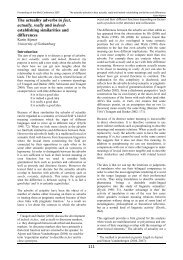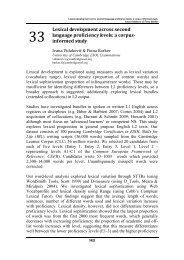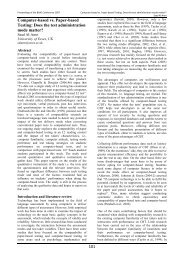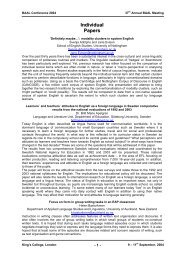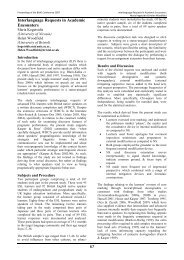Proceedings of the - British Association for Applied Linguistics
Proceedings of the - British Association for Applied Linguistics
Proceedings of the - British Association for Applied Linguistics
You also want an ePaper? Increase the reach of your titles
YUMPU automatically turns print PDFs into web optimized ePapers that Google loves.
The Impact <strong>of</strong> <strong>Applied</strong> <strong>Linguistics</strong>: <strong>Proceedings</strong> <strong>of</strong> <strong>the</strong> 44th Annual Meeting <strong>of</strong> BAAL<br />
University <strong>of</strong> <strong>the</strong> West <strong>of</strong> England<br />
Extract 8.1: [Bold font is used to transcribe talk uttered in English]<br />
17. Teacher: c’est où↑ (.) c’est pas à la maison c’est où↑<br />
where is it↑ (.) it’s not at home it’s where↑<br />
18. […]<br />
19. Karen: euh en anglais on dit (.) elle est dans le junkyard<br />
er in English we say (.) she is in <strong>the</strong> junkyard<br />
20. Teacher: oui mais en français on dit quoi↑<br />
Yes but in French what do we say↑<br />
Here, talk is conducted in French and Karen’s alternation to English (19) is<br />
oriented to by <strong>the</strong> teacher as being a problem that needs to be repaired (20).<br />
This indicates that only French is <strong>the</strong> “medium <strong>of</strong> classroom interaction”<br />
(Bonacina & Gafaranga, 2011). This French monolingual medium is in line<br />
with <strong>the</strong> LP stated by <strong>the</strong> educational system. In this regard, this extract<br />
shows that it is indeed possible to understand classroom participants’<br />
choice <strong>of</strong> medium <strong>of</strong> interaction with regards to <strong>the</strong> school language policy<br />
and, more generally, to interpret language practices vis-à-vis a policy found<br />
outside interaction.<br />
Policy within practice: <strong>the</strong> ‘practiced language policy’<br />
However, this is not always <strong>the</strong> case. In <strong>the</strong> corpus under study, many<br />
instances <strong>of</strong> language choice and alternation acts cannot be interpreted<br />
against <strong>the</strong> French monolingual language policy set by <strong>the</strong> school. As an<br />
example, consider extract 8.2 below:<br />
Extract 8.2: [Bold font is used to transcribe talk uttered in Spanish]<br />
226. Talia: que te dijo Amanda↑<br />
What did Amanda tell you↑<br />
227. Leila: me dijo (.) toma esto no tiene chile (.)(me disimulo)<br />
228. (.) lo probé y casi lo vomito<br />
She told me (.) take this it doesn’t have chilli in it (.) she<br />
lied to me (.) I tried it and almost vomited it<br />
229. (.1)<br />
230. Talia: que tenía↑<br />
What did it have↑<br />
231. (.)<br />
232. Leila: chile<br />
chilli<br />
Here, <strong>the</strong> use <strong>of</strong> a language o<strong>the</strong>r than French is not seen as a problem.<br />
Spanish is not translated back into French; it is <strong>the</strong> code <strong>of</strong> interaction.<br />
More specifically, <strong>the</strong> two pupils are interacting in a Spanish monolingual<br />
32



